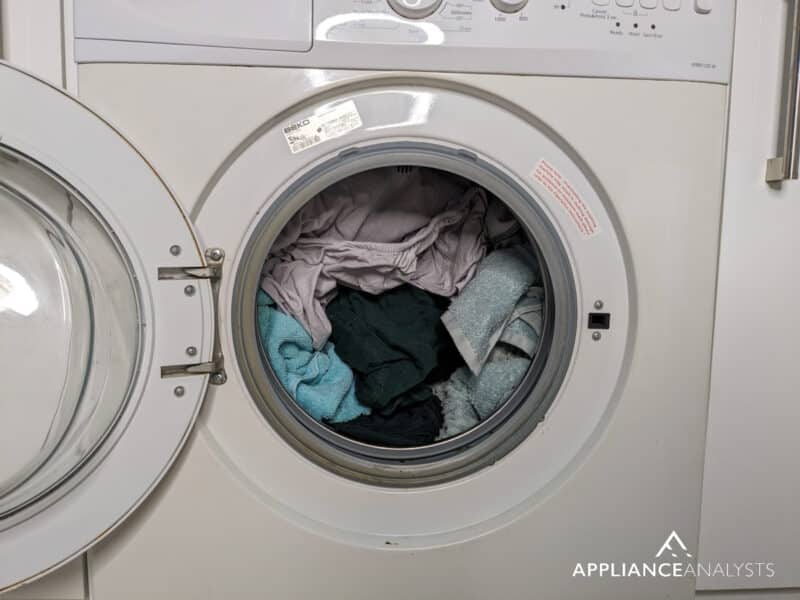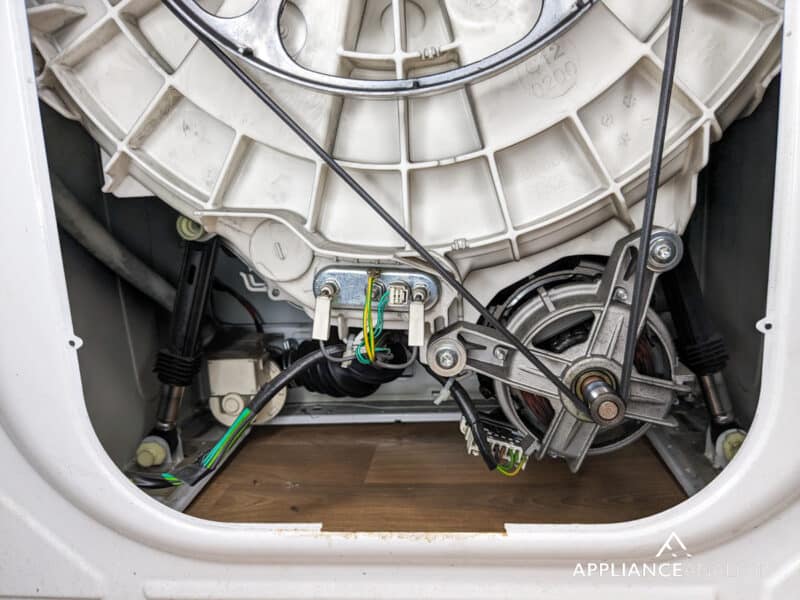We've independently reviewed this article to make sure it's as accurate as we can make it.
To find out more about our article creation and review process, check out our editorial guidelines.
Are you wondering why your washer overheats and how you can prevent it?
So are thousands of homeowners all around the world! Believe it or not, having your washer overheat is not uncommon, nor is it always a death sentence for your appliance.
I know the whole situation can be confusing, but luckily, you’ve come to the right place for answers. Below, you’ll find a list including the main symptoms behind a washer that’s overheating, as well as 3 simple solutions for each one.
When your washer overheats, you might notice the glass steaming, extremely hot clothes coming out of a cycle, or what appears to be an overheating motor.
Keep reading to cool your washer down!
What Does an Overheating Washer Mean?
While there’s no cookie-cutter answer to that question, there are common causes behind a washer that’s overheating. Sometimes, the overheating comes from overloading the washer, while in other instances, the drum is unbalanced.
There’s an endless world of possibilities when it comes to such a situation, so let’s take a closer look at the main symptoms behind an overheating washer, the potential solutions, and the most common causes.
#1 The Glass Is Steaming
Let’s start by discussing a common symptom of an overheating washer that concerns several people daily – a steaming glass.
The “issue” is most common in top load washers with a see-through glass at the top, especially during hot or “Sanitize” cycles. From what I’ve seen, the glass steams up within seconds due to the hot water coming in at the beginning of the cycle.
I understand how seeing your top load washer’s glass steam up within seconds can be very concerning, but believe it or not, the steaming is neither a problem nor a sign that your washer is overheating.
Solution: Since the glass steaming is not an actual problem, there’s no fix needed! Please let your washer do its job and wait for it to finish its cycle.
#2 Clothes Are Extremely Hot
Moving on, let’s talk about clothes that come out extremely hot from a laundry cycle, as that can be a sign that your washer overheats often.
If you set your laundry cycle to do a cold or warm wash and the clothes come out extremely hot, or every load feels hot regardless of the setting, you likely have to take a closer look at how the hoses at the back of the appliance are connected to your water supply.

The primary cause for clothes coming out extremely hot from your washer is that the hot and cold water lines are reversed.
Solution: To address the situation, please follow the steps below:
- Pull out the washer to access the backside where water lines are attached.
- Start a normal wash cycle on a warm water temperature setting, as this activates both hot and cold valves.
- After 2-3 minutes, feel where the hoses meet the washer.
- On the washer, labels indicate hot (H) and cold (C). If the cold label is hot and vice versa, then the hoses are reversed.
Provided your washer’s water lines are reversed, I’ve found that detaching and reattaching them in the correct position will do the trick and get everything back to normal.
Note: Please be careful when swapping the hoses, as the water coming from them can be scalding. Wear gloves or any other protective equipment you have handy to prevent burns.
#3 The Motor Is Overheating
Lastly, let’s talk about the most concerning consequence of a washer that overheats – an overheating motor. Although washers seem complex in design, the reality is that the motor is the only part inside them that uses any significant amount of electricity and power.
As such, the motor is the only actual component within your washer that can get excessively hot and be damaged as a result.
An overheating motor is no joke. Failing to address signs of overstress or overheating in your washer’s motor can result in the motor breaking down (which is very expensive and complex to repair), a reduction in your washer’s lifespan, and sometimes, even a fire.

Solution: If you suspect your washer’s motor is overheating and/or you see smoke coming from the appliance, my usual advice is to turn off the washer immediately and contact a certified washer technician.
I understand it’s inconvenient not to be able to use your washer until a professional takes a closer look at the problem, but trying to do your laundry when there’s smoke coming from the motor is extremely dangerous!
A Recap in Good Habits
Now that you know why your washer overheats, the main symptoms of an overheating washer, and the solutions you can implement to address the situation, let’s quickly recap how you can keep your appliance in tip-top shape.
- Check the Hoses: Ensuring the hot and cold washer inlets are connected to the right outlets in your home’s water supply can prevent hot clothes, detergent issues, and much more.
- Clean Your Washer: Keeping your washer clean and checking the water inlets and their filters once every couple of months can go a long way in ensuring the appliance lasts a long time and completes cycles successfully.
Cooling Down an Overheating Washer
When your washer overheats, it’s understandable that you feel worried about the situation – especially if there’s smoke coming from the appliance.
Luckily, as I hope this piece has helped you better understand, signs of an overheating washer are not always that. Sometimes, such as when your top load washer’s glass is steaming, there’s nothing to worry about – all you have to do is wait for the cycle to complete.
Thanks for reading. If this article was useful and answered your most burning questions, please check out our other resources and free guides below.
Happy washing!
-Craig.







